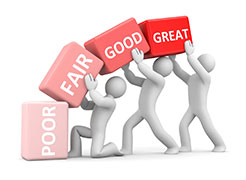 As the end of the year draws near, many of us are engaged in the daunting task of creating performance appraisals for our team members. Few people enjoy filling out performance reviews, and even more find the process unproductive. Yet, in most organizations, it is a required management activity and it determines which employees are penalized or rewarded for their work. Raises and promotions are often tied to performance reviews, so it’s important managers are committed to creating an accurate portrayal of their team member’s work.
As the end of the year draws near, many of us are engaged in the daunting task of creating performance appraisals for our team members. Few people enjoy filling out performance reviews, and even more find the process unproductive. Yet, in most organizations, it is a required management activity and it determines which employees are penalized or rewarded for their work. Raises and promotions are often tied to performance reviews, so it’s important managers are committed to creating an accurate portrayal of their team member’s work.
Knowing how important a performance appraisal is for immediate rewards such as bonuses and raises as well as the long term impact on a person’s career, it’s troubling how often performance appraisals are riddled with bias. For example, Stanford University’s Clayman Institute for Gender Research is currently reviewing the language used in 125 performance appraisals at a tech company and has already found disturbing trends:
• Women’s performance appraisals reference their communal or nurturing style twice as often as men’s (“helpful” or “dedicated”).
• Managers are 7X more likely to tell their male employees that their communication style is too soft. However, women receive 2.5 times as much feedback noting their aggressive communication style.
• Women’s evaluations attribute successes to team accomplishments (as opposed to individual ones) over twice as often as men’s evaluations.
• Men hear nearly twice as many references to their technical expertise and their vision.
Interestingly, these trends hold true whether the person delivering the performance appraisal is male or female.
Managers may not consciously intend to include more critical feedback for women in a performance review, yet evidence suggests they do. Those same managers may not realize they often use the word abrasive to describe female employees, but never use the word for male colleagues. If asked, no doubt these managers might vehemently deny having a gender bias in the workplace. And yet, unconscious bias is clearly present among both genders and has a long term effect on the ability of the organization to secure top talent, make better strategic decisions and deliver products and services representative of their markets.
Unconscious bias results in automatic thinking that is corrupt with errors. The only way to correct our natural, biased appraisal of others is to commit to a higher level of thinking. It takes both attention and intent to overcome unconscious bias.
As you read over your performance appraisals this year, pay attention to the words you use. Do you notice any trends? Are they fair and objective? Are you evaluating everyone on the same clear and consistent criteria?
Also, consider asking a trusted colleague to review your appraisals. They may notice trends that are unintentional on your part. Additionally, just knowing that someone else will be reviewing your work for fairness and consistency will make you more aware of and accountable for the words you choose.
When we are aware of our biases and actively address them, they are less likely to unconsciously dictate our actions.
